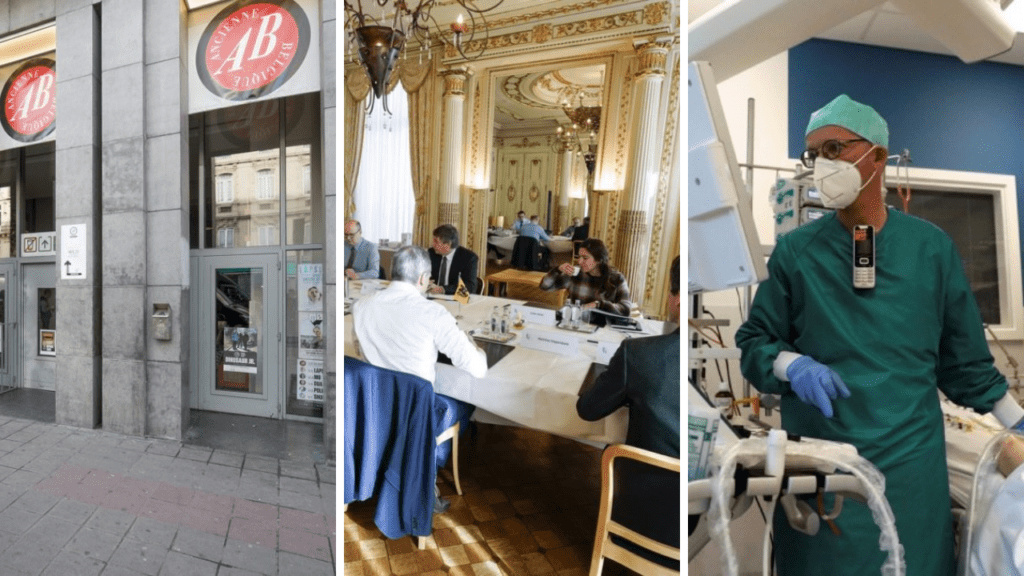As communication about the measures in this phase of Belgium's exit plan becomes increasingly unclear (which pupils can go back to school, and when?), mayors have asked ministers to refrain from announcing news until everything is confirmed.
Lack of coordination and training is also to blame for Belgium's contact tracing system not being quick enough yet, but the number of new infections has dropped below 150 regardless.
So what's the other news of the day? We look at the latest figures, Carrefour is temporarily lowering the prices of about 1,000 products, and Latvians should not travel to Belgium, apparently.
With so much information, and so little time to catch up before it potentially changes again, here are some of the top stories from around the country to get you up to speed.
Belgium in Brief is a free daily roundup of the top stories to get you through your lunch break conversations. To receive it straight to your inbox every day, sign up below:
1. 36 new hospital admissions, 145 discharged in Belgium
137 additional people have tested positive for the new coronavirus (Covid-19) in Belgium in the last 24 hours, according to figures by the Federal Public Health Service on Wednesday.
This brings the total number of confirmed cases in Belgium since the beginning of the pandemic to 57,592. The total reflects all people in Belgium who have been infected, and includes confirmed active cases as well as patients who have since recovered, or died from the consequences of the virus.
91 of the newly-infected people live in Flanders, 31 live in Wallonia, and 15 live in Brussels. Read more.
2. Discount ban: Carrefour cuts prices as market share grows
As prices begin to stabilise back to a pre-coronavirus level, supermarket chain Carrefour has announced that it will temporarily lower the prices of 1,000 products in stores in Belgium as the supermarket giant’s market share grows in the country.
The price drop – which will take effect on Wednesday – will run until the end of June, and follows a year of strong growth by the French company in stores across Europe.
According to the group, 2020 kicked off with a strong start in January and February, when comparable growth was already 4.5%. This, in turn, was further helped by the ‘corona bonus’ in March. Read more.
3. Flemish mayors criticise communication on exit plan
Flemish mayors are annoyed by the premature communication by regional ministers and governments about measures that have not officially been approved yet.
“My colleagues and I have no problem taking responsibility, but do not create chaos that we always have to rectify,” wrote Christophe De Graef, mayor of Diest in the Flemish Brabant province, in a Facebook post on Sunday. Several other mayors have since spoken out about what they call premature communication that only serves to confuse the citizens. Read more.
4. Brussels students will take exams in Ancienne Belgique
To be able to respect the social distancing measures between students taking their exams, many universities are organising part of their exams in different locations off-campus.
As the Brussels branch of the KU Leuven university is spreading out its students as much as possible in their classrooms, they do not have enough room on campus. Some 4,000 students from KU Leuven Campus Brussels and University-College Odisee will therefore have to take their exams in the Ancienne Belgique concert venue. Read more.
5. Lack of coordination slows down Belgium’s contact tracers
Belgium’s contact tracing strategy is not as efficient as desired, according to critics who say lack of coordination and training mean the country’s “corona detectives” are not contacting people quickly enough.
Less than a month since it began operating on 11 May, doctors and health officials are already pointing out flaws in the system which risk hindering authorities’ ability to keep tabs on the virus. Read more.
6. Germany considers lifting travel warnings for 31 countries
The German government wants to lift travel warnings for 31 European countries as of 15 June if the health situation allows it, the DPA press agency reported on Tuesday.
Great Britain, Iceland, Norway, Switzerland and Liechtenstein are on the list, along with the 26 EU countries, according to DPA. The German government is due to make a decision on Wednesday. Read more.
7. Latvia asks citizens not to travel to Belgium
Latvian citizens, in general, are encouraged not to travel abroad, but six countries in particular should be avoided, according to experts at the Latvian Centre for Disease Prevention and Control (Slimību profilakses un kontroles centrs – SPKC).
On the list published by the SPKC on Monday, Belgium, as well as Sweden, the UK, Ireland, Portugal and Malta are highlighted in red, meaning a journey is “not recommended.” Read More.
Maïthé Chini
The Brussels Times



